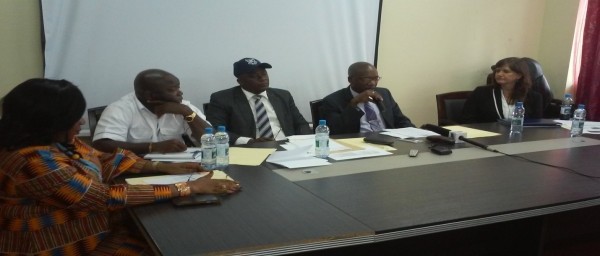
By Ibrahim Siraju Bah :
The Right to Access Information Commission (RAIC) has officially launched the Open Data Readiness Assessment (ODRA) for Sierra Leone in a day’s workshop organized by the Commission in collaboration with the World Bank at the Conference Room of the Ministry of information and Communications.
The occasion which attracted over 50 participants drawn from Ministries, Departments, Agencies, Civil Society Organizations and the media deliberated on fundamental issues regarding the right to access information and the need to enhance the phenomenon.
In his keynote address, the Deputy Minister of information and Communications Theo Nicole noted that the Open Aid Partnership (OAP) of the World Bank has been collaborating with the Government of Sierra Leone to increase transparency and to support open data initiative since 2013 and has supported the Government to launch a National Open Data Portal (NODP) which is currently managed by the Right to Access Information Commission.
As a follow up to the existence of the Portal, he said the Ministry of Information and Communications approached the World Bank to support them in carrying out an Open Data Readiness Assessment for Sierra Leone.
Mr. Nicole thanked the World Bank on behalf of Government and the Right to Access Information Commission for giving them the opportunity to collaborate in conducting the Open Data Readiness Assessment for the country as well as for their continuous commitment to transparency and accountability and for carrying forward the Open Data Gender in Sierra Leone.
The Deputy Minister said ODRA will provide guidance on how to design, implement and manage an open data initiative and recommendations for key strategic actions to ensure the sustainability of the Open Data Portal as well as open data contributions to enhancing service delivery particularly in support of the post Ebola recovery effort.
He noted that the Ebola epidemic clearly demonstrated the need for open data policies and practices in Sierra Leone, saying that if they had access to detailed, timely and relevant information at the start of the outbreak that could have helped them in coordinating their response effort and it could have also help to have rapid response that could have saved so many lives.
He further stated that an efficient open data system will assist all interested parties in monitoring economic, political and social issues within the country.
The Chairman Right to Access Information Commission (RAIC) Mr. Unisa Sesay reiterated the role of the Commission saying that the Commission seeks to enhance openness of data held by public authorities in order to ensure transparency and accountability. He said the RAI Act of 2013 has clearly stated the classes of information that form the core proactive publication obligation for every public authority and encouraged them to adhere to the provisions of the Act. He further informed his audience that the Commission is currently working on model of publication scheme for the different classes of public authorities.
Mr. Sesay encouraged all government officials to collaborate with the Commission and adhere to the RAI Act noting that the Commission has the powers of the High Court and that whoever falters will be dealt with accordingly. He said all MDAs are required to have Public Information Officers and archivists whose roles are crucial in implementing the right to access information law.
He said the Commission is at its infant stage grappling with some challenges that include funds and capacity building but since it was established in 2014, they have been working with partners like the OGI that has handed over the Open Data Portal to the Commission whilst the Commission has also set up the Open Data Council (OPC). The Chairman of the Commission recognized the role of the Society for Democratic Initiative (SDI), the Campaign for Good Governance (CGG) and other key partners for their invaluable support.
In his opening remarks, the Chairman for the Occasion who also doubles as the Executive Secretary of the Right to Access Information Commission, Mr. Edward Kwame Yankson said the launching of the Open Data Readiness Assessment for Sierra Leone, after the handing over of the Open Data Portal to the Commission by the Open Government Initiative (OGI) is a transparency initiative by government to open its books and promote transparency and accountability. He said the Oath of Secrecy which they are trying to break will not happen overnight but by building strong institutions they will get there. He said opening information is not an easy task all over the world and it took ten years of advocacy before the RAIC Act was finally enacted in parliament.
The Lead Consultant on ODRA, Geanne Holm in a power point presentation said Open Data Readiness Assessment (ODRA) is a tool designed to build a diagnosis and an action plan for open data custom-tailored to country, sub national government, city or sector. She said the output is an action plan and a report that provides recommendations for the government. She further stated that government need to share data to improve government efficiencies, service delivery, meet regulatory compliance, better communicate with citizens and stakeholders, create internal efficiencies and drive innovation and economic growth which she said is key to enhancing good governance in a democracy. The lead Consultant on ODRA emphasized the importance of open data saying that the initiative could be use by various sectors including health care, civil society, financial services, communication and media, energy and utilities, government, manufacturing, technology, transportation and the like.
The Director, Performance Management and Service Delivery in the Office of the Chief of Staff, Abdul Rahman Sowa observed that open data is the eleventh commitment of Government saying that government is in haste to see to it that it is achieved. He therefore urged all other public institutions to cooperate and work with the Commission. He further encouraged the Commission to work hard in order to make the phenomenon a success noting that they, in the Office of the Chief of Staff, will soon come to enquire about the progress the Commission has been making.



